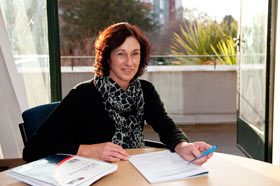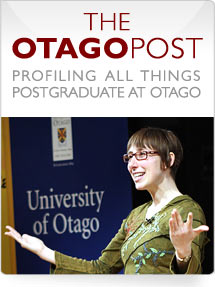 Thursday 28 April 2016 9:48amThe Otago Post issue 8
Thursday 28 April 2016 9:48amThe Otago Post issue 8
Claire Gilbert, Masters' candidate
Department of Psychological Medicine
Not long after Christchurch-based mental health nurse and addiction worker Claire Gilbert took up a position managing a clinic for women with addictions, she identified that most of the women also experienced a range of other psychological disorders — with anxiety disorders highly prevalent.
Yet compared to depression — a well-publicised psychological disorder — little was known about the impact of the equally pervasive anxiety disorder on the mental health of people coping with addictions, and possibly other disorders. In 2003 Claire enrolled part-time in a distance-taught Postgraduate Certificate in Health Sciences, and pursued further study while juggling full-time work and parenting. The Certificate led to a Diploma and in 2007, Claire embarked on a Masters degree in Health Science based with the Department of Psychological Medicine at the Christchurch School of Medicine.
With her background as a psychiatric nurse Claire was particularly interested in the coexisting mental health problems (CEP) people with addictions experienced and the treatment they received. She undertook a research project canvassing the New Zealand addiction workforce to investigate the practices of addiction workers in addressing CEP with people engaged in addiction treatment. Claire's research involved formulating specific questions about the assessment and treatment of CEP by addiction workers and then analyzing their responses. Results from her research indicated a need for addiction workers to incorporate inquiry about CEP, such as anxiety, during a comprehensive assessment.
Throughout her studies Claire appreciated the integration of clinical and academic learning and found this readily enabled the practical application of her learning. “The course was based around clinical work, so it was applicable and it helped me to use my workplace for clinical learning. The course lecturers were also readily available and promoted discussion, and they showed some flexibility with deadlines — they really considered the real world stresses that exist on their students.”
Claire reflects that distance study requires numerous skills including valuable time management skills which have proved helpful in other areas of her life. These ensure she makes time in her day to have fun, shares time with her children. She acknowledged that asking for help from both her friends and her lecturers was essential.
“You start to realise you don't have all the time in the world. You have to be more efficient, and you also have to make sure you retain a work/life balance. There are times when you knuckle down, but you also learn to catch those moments with family and friends.”
